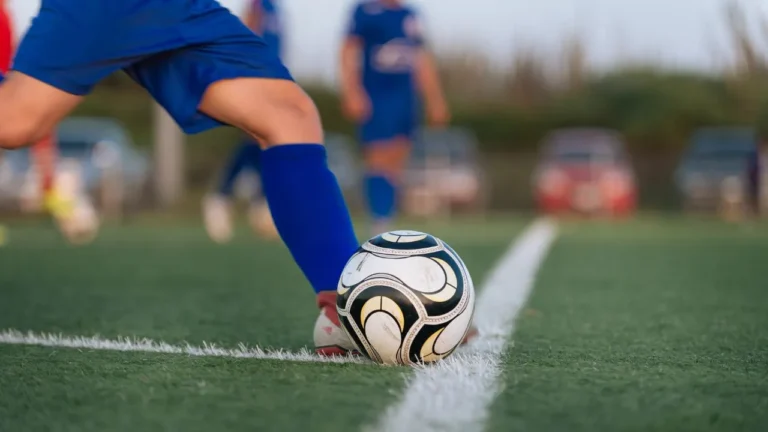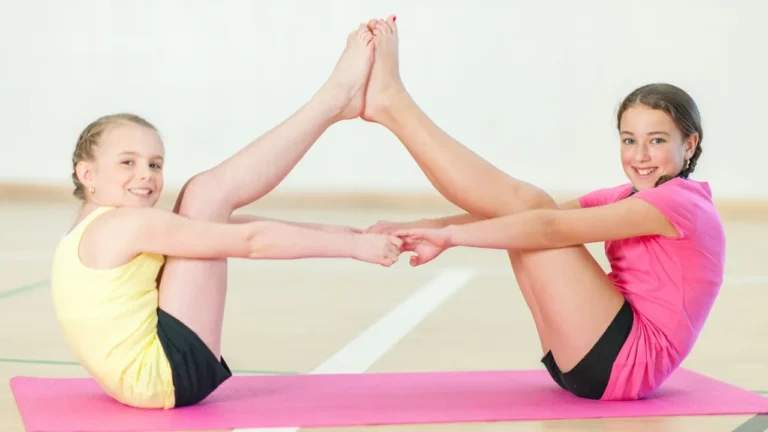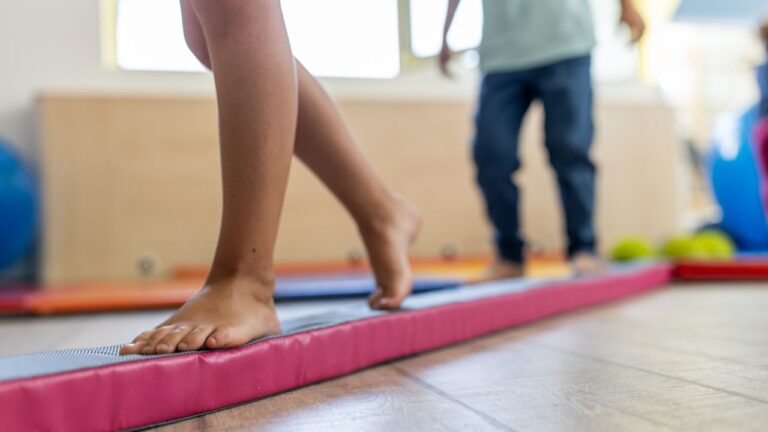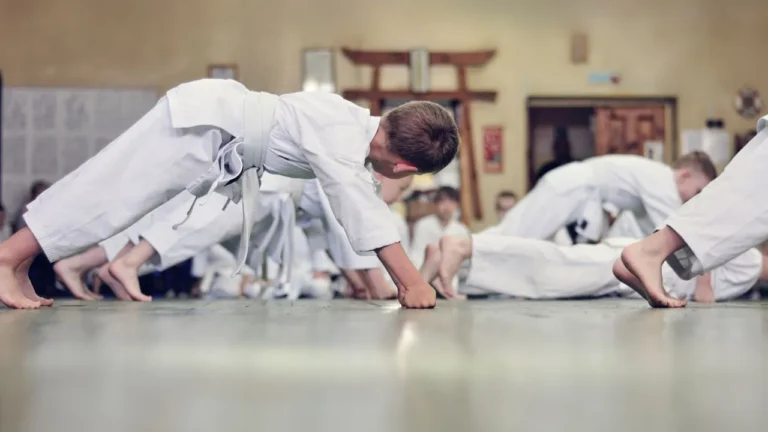Strength Training for Kids: Simplified Safe and Effective Workouts!

Strength training for kids and adolescents has gained significant attention in recent years, as both parents and coaches recognize its numerous benefits. In this article, we will explore strength training exercises for kids, providing a framework for a well-rounded training program that promotes overall physical activity and addresses the unique needs of children and adolescents.
We will also debunk common myths around strength training for kids and discuss the importance of proper technique and supervision for safe and effective workouts.
From building strength and improving sports performance to boosting mental well-being and developing healthy habits, strength training has a lot to offer kids and teens.
As the American Academy of Pediatrics and the American College of Sports Medicine endorse resistance training and aerobic activity for young people, parents, and coaches need to understand the best practices and exercises to help children get stronger and healthier.
Throughout this guide, we will cover age-appropriate strength training guidelines, safety tips, well-rounded strength training routines, top strengthening exercises for kids, nutrition advice, and motivation strategies.
With a focus on body weight exercises, proper form, and injury prevention, we aim to provide a comprehensive resource for parents, coaches, and young athletes looking to reap the benefits of strength training.
Benefits of Strength Exercises for Kids
Elevated Physical Health
Strength training presents a myriad of advantages for children and teens, encompassing improved body composition, a positive body image, and augmented muscle strength. The American Academy of Pediatrics and the American College of Sports Medicine endorse the integration of resistance training and aerobic activities in a young individual’s fitness regimen, fostering healthy body weight maintenance, injury risk reduction, and overall physical health enhancement.
Amplified Athletic Performance
Strength training exercises for kids will not only build muscle but also significantly elevate sports performance. By cultivating core strength, upper and lower body power, and body awareness, young athletes can augment their agility, speed, and endurance across various sports. A comprehensive strength training program can further aid in injury prevention by reinforcing major muscle groups and bolstering joint stability.
Heightened Mental Well-Being
Youngsters who consistently engage in strength training may experience notable improvements in their mental well-being. Strength training can foster self-esteem, promote a favorable body image, and empower children and adolescents to develop confidence in their capabilities. Furthermore, regular physical activity, including strength training, has proven to alleviate stress and anxiety levels among young people.
Cultivation of Healthy Habits
Introducing strength training to children at a tender age fosters the establishment of healthy habits that can persist throughout their lives. By instilling the importance of regular physical activity, proper technique, and gradual progression in kids, parents, and coaches can help them construct a sturdy foundation for lifelong fitness. Moreover, children who partake in well-structured strength training programs are more inclined to sustain an active lifestyle as they mature.
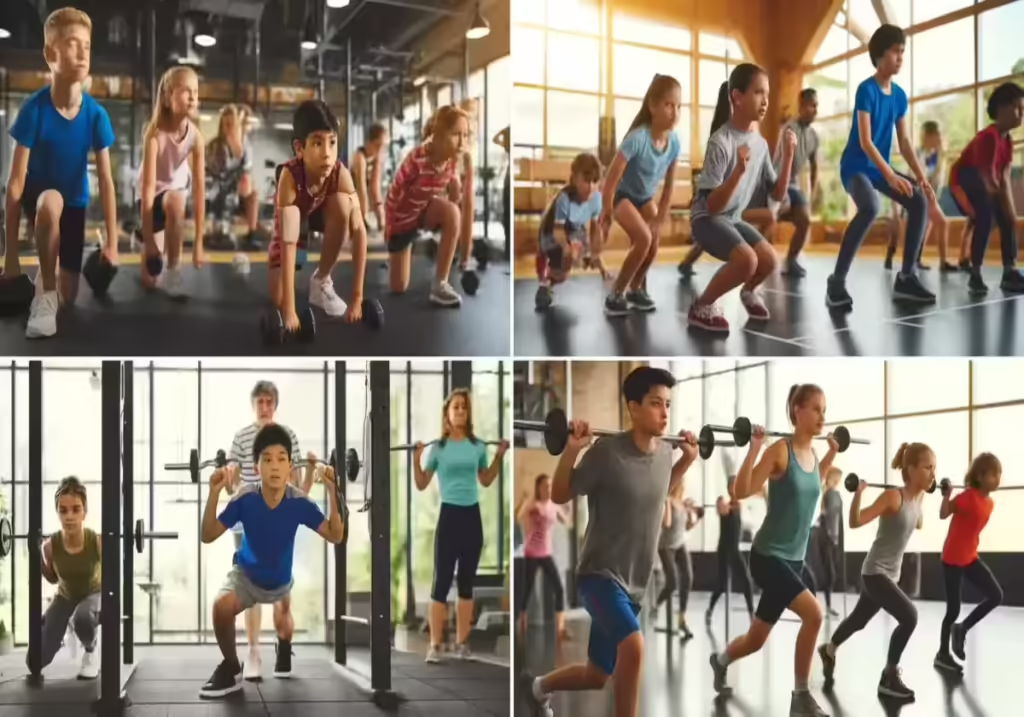
Age-Specific Strength Training For Kids Guidelines
Pre-adolescent Kids (7-11 years old)
For children aged 7 to 11, strength training should concentrate on honing fundamental skills and muscle strength through bodyweight exercises and functional movements. During this phase, it’s imperative to prioritize proper form, technique, and safety over the amount of weight lifted.
Exercises should comprise a blend of upper and lower body movements, as well as core exercises, to address all major muscle groups. A meticulously designed training program should also encompass 10 minutes of light aerobic activity to warm up, followed by strength exercises executed for 1 to 10 repetitions in 1 or 2 sets, 2 or 3 times per week.
Adolescent Kids (12-16 years old)
As children transition into adolescence, their strength training program can progressively escalate in intensity and intricacy. This age group can begin incorporating free weights, resistance bands, and weight machines, always under appropriate supervision and with a focus on impeccable form.
Training sessions should persistently emphasize safety and technique, and exercises should be performed for 8 to 12 repetitions in 2 to 3 sets, 2 or 3 times per week. It remains essential to continue incorporating aerobic activity and flexibility exercises in their training regimen.
Late Adolescents (17-19 years old)
Late adolescents with previous strength training experience can further refine their skills by elevating the intensity and diversity of their workouts. At this stage, young athletes can delve into more advanced strength-training exercises for kids, including complex movements and maximal strength training.
However, it remains crucial to maintain proper form, ensure adequate rest between sessions, and avoid overtraining. A comprehensive strength training program for this age group should also incorporate aerobic and flexibility exercises.
Paramount Safety Measures for Kids’ Strength Training
Emphasis on Thorough Supervision
Ensuring proper supervision is vital during strength training sessions for children and adolescents. Experienced trainers, coaches, or knowledgeable parents should closely monitor the young athletes to guarantee adherence to safety guidelines, correct form, and appropriate exercise selection. This meticulous oversight minimizes the risk of injury and fosters a secure and productive training environment.
Concentration on Technique and Form
Mastering proper technique and form is essential for kids engaging in strength training exercises. Prioritizing form over the amount of weight lifted reduces injury risk and maximizes the effectiveness of each exercise. Young athletes should receive clear instructions and demonstrations, allowing them to understand and execute each movement with precision and control.
Gradual Progression of Intensity
A prudent approach to increasing intensity is crucial for the safe and effective development of strength in young athletes. Gradually introducing more challenging exercises, additional weight, or increased repetitions enables children and adolescents to build strength progressively while minimizing the risk of injury or overtraining. This approach also accommodates their growth and development, allowing for natural adaptations to strength training stimuli.
Sufficient Rest and Recovery
Adequate rest and recovery play a pivotal role in preventing injuries and facilitating progress in kids’ strength training. Young athletes should have ample time between sessions for their muscles to recuperate, repair, and grow stronger. Additionally, incorporating rest days and monitoring signs of fatigue or overtraining can help maintain a balanced and effective training program.
Crafting a Well-Rounded Strength Training Program
Balancing Strength, Flexibility, and Aerobic Exercise
A comprehensive strength training program for kids should encompass a balance of strength exercises, flexibility training, and aerobic activities. This harmonious blend bolsters overall fitness promotes injury prevention, and ensures well-rounded athletic development.
Dedicating time to stretching and aerobic activities such as running, swimming, or cycling can also enhance strength gains and improve sports performance.
Integrating Functional Movements
Incorporating functional movements into a child’s strength training program is essential for fostering practical strength and movement efficiency. Functional exercises, such as squats, lunges, and push-ups, mimic everyday movements and support improved motor skills, balance, and coordination. These exercises also engage multiple muscle groups, maximizing the benefits of each training session.
Rectifying Muscle Imbalances
Identifying and addressing muscle imbalances in young athletes can significantly reduce injury risk and improve overall athletic performance. A well-designed strength training program should incorporate exercises targeting both agonist and antagonist muscle groups, ensuring symmetrical strength development. By focusing on balanced muscle growth, young athletes can enjoy a more robust and injury-resistant physique.
Cultivating a Fun and Engaging Environment
Creating a fun, engaging, and positive environment is crucial for maintaining kids’ interest and motivation in strength training. Incorporating variety, setting achievable goals, and celebrating milestones can make each training session enjoyable and rewarding. Encouraging camaraderie and teamwork among young athletes also fosters a supportive atmosphere that promotes long-term commitment to physical fitness.
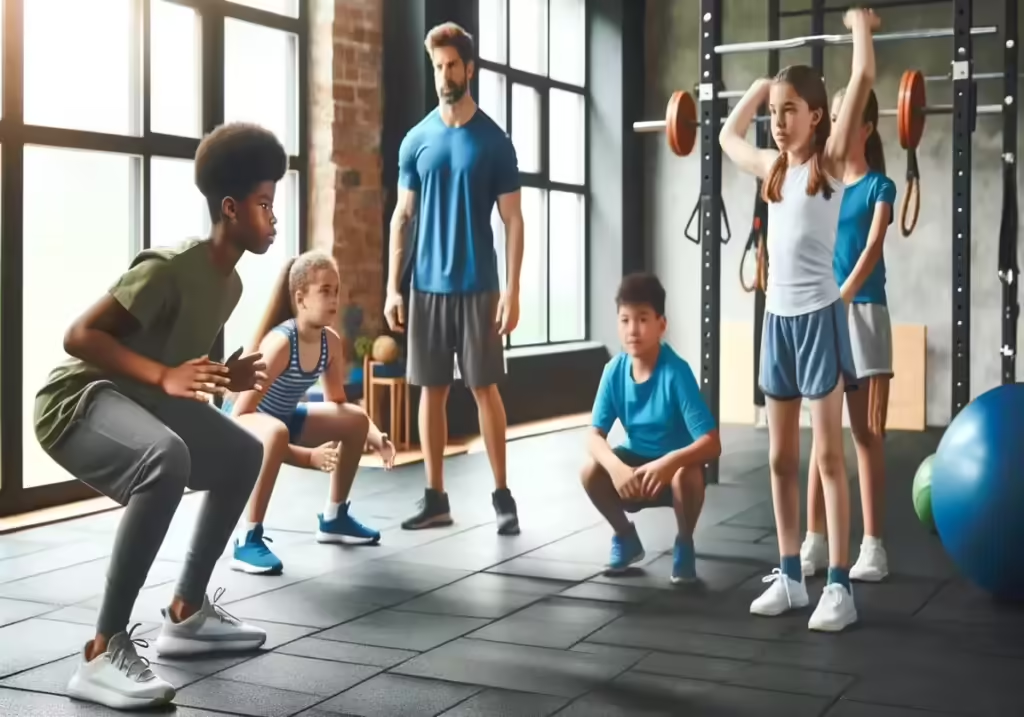
Top Strength Training Exercises for Kids
Bodyweight Exercises
Bodyweight exercises, such as push-ups, squats, lunges, and planks, provide an excellent foundation for strength training in children. These movements require minimal equipment, can be adapted for various fitness levels, and focus on building functional strength. As children progress, they can incorporate more advanced variations or increase the number of repetitions to maintain a challenging workout.
Resistance Band Workouts
Resistance bands offer a versatile and effective way for kids to engage in strength training exercises. They can be used to perform a wide range of upper and lower body exercises, targeting various muscle groups. Resistance bands are an ideal option for young athletes as they provide a safe and easily adjustable means of resistance, allowing for proper technique development and progression.
Medicine Ball Exercises
Medicine ball exercises are another excellent addition to a strength training program for kids. They help develop coordination, balance, and core strength, while simultaneously engaging multiple muscle groups. Some popular medicine ball exercises include chest passes, overhead throws, and rotational twists. Ensure that the weight of the medicine ball is appropriate for the child’s age and skill level to prevent injuries.
Age-Appropriate Weightlifting Techniques
As children grow older and gain experience in strength training, they may begin to incorporate weightlifting techniques into their workouts. Free weights, such as dumbbells and barbells, can be used to perform a variety of exercises targeting major muscle groups.
It is crucial to prioritize proper form, use age-appropriate weights, and ensure adequate supervision to minimize injury risk. Weight machines can also be utilized, offering guided movements and adjustable resistance levels to accommodate young athletes’ needs and abilities.
Nutritional Considerations for Young Athletes
Balancing Macronutrients
Proper nutrition is crucial for supporting the growth, development, and performance of young athletes engaged in strength training. A well-balanced diet should include a mix of carbohydrates, proteins, and fats to provide the necessary energy and nutrients for optimal health. Carbohydrates fuel exercise, proteins support muscle growth and repair, and healthy fats contribute to overall health and brain function.
Staying Hydrated
Hydration is a vital aspect of nutrition for young athletes, as it affects both performance and recovery. Encourage children to drink water before, during, and after training sessions and monitor their fluid intake throughout the day. Providing access to water or sports drinks during workouts can also help maintain proper hydration levels and prevent dehydration-related issues.
Timing Meals and Snacks
Timing meals and snacks appropriately can have a significant impact on a child’s energy levels and performance during strength training. Consuming a balanced meal 2-3 hours before a workout provides the necessary fuel, while a small snack 30 minutes to an hour before exercise can help maintain energy levels.
Post-workout nutrition should include a combination of carbohydrates and protein to support recovery and muscle growth.
Encouraging a Healthy Relationship with Food
Fostering a healthy relationship with food is essential for young athletes, as it sets the foundation for lifelong habits. Encourage children to view food as fuel for their bodies, and teach them the importance of consuming a balanced diet. Avoid using food as a reward or punishment and focus on nurturing a positive, balanced approach to nutrition.
Addressing Common Myths and Misconceptions
Stunted Growth
One widespread myth is that strength training stunts the growth of children and adolescents. Numerous studies have debunked this misconception, showing that, when done correctly and under proper supervision, strength training is safe and beneficial for young athletes, without negatively impacting their growth and development.
Age Restrictions
Many people mistakenly believe that children should not participate in strength training until they reach a specific age. However, experts agree that kids can safely engage in strength training as long as exercises are age-appropriate, well-supervised, and focused on technique and form rather than heavy lifting.
Girls and Strength Training
Another common misconception is that strength weight training is unsuitable or unnecessary for girls. In reality, strength training offers numerous benefits for both boys and girls, including improved athletic performance, injury prevention, and increased self-esteem. Encouraging girls to participate in strength training can help dispel gender stereotypes and promote a healthy, active lifestyle.
The Necessity of Expensive Equipment
Some people may assume that strength training requires expensive or specialized equipment. However, many strength training exercises for kids can be performed using body weight, resistance bands, or simple items found at home.
Investing in a few affordable pieces of equipment, such as dumbbells or a medicine ball, can also provide a versatile and effective strength training routine for children.

Involving Parents and Coaches
Providing Support and Encouragement
Parents and coaches play a crucial role in a child’s success in strength training. Offering support and encouragement, setting realistic goals, and celebrating progress can help keep young athletes motivated and engaged in their training program.
Ensuring Proper Supervision
Parents and coaches are responsible for ensuring that strength training sessions are conducted safely and effectively. This includes providing proper supervision, teaching correct technique and form, and monitoring exercise selection and progression. By overseeing each session, adults can help minimize injury risk and create a safe and productive training environment.
Promoting a Team-Oriented Approach
Fostering a sense of teamwork and camaraderie among young athletes can significantly enhance their strength training experience. Encouraging cooperation, friendly competition, and mutual support can create a positive atmosphere that promotes long-term commitment to physical fitness and overall well-being.
Ongoing Education and Communication
Maintaining open lines of communication between parents, coaches, and young athletes is essential for a successful strength training program.
Discussing goals, progress, concerns, and any potential obstacles can help keep everyone on the same page and working together to achieve the desired outcomes. Parents and coaches should stay informed about current guidelines, research, and best practices to provide the most effective and up-to-date training recommendations.
How to Keep Kids Motivated in Strength Training
Setting Achievable Goals
One of the most effective ways to keep kids motivated in strength training is by setting realistic and achievable goals. These goals should be specific, measurable, and time-bound, providing a clear target for young athletes to work towards. By setting goals that are challenging yet attainable, children will feel a sense of accomplishment and be more inclined to stay committed to their training program.
Encouraging Positive Self-Talk
Positive self-talk plays a crucial role in maintaining motivation and fostering a healthy mindset. Encourage kids to speak kindly to themselves, focusing on their strengths and progress rather than dwelling on any setbacks or perceived weaknesses. By cultivating a positive attitude towards their abilities and training, children will be more likely to persevere and enjoy the process of building strength.
Tracking Progress
Keeping track of a child’s progress in strength training can be an excellent motivator. Record improvements in technique, increase in weight lifting, or the number of repetitions performed, and periodically review this data with the child. Seeing tangible evidence of their progress can help young athletes stay motivated and inspired to continue working hard in their training sessions.
Celebrating Milestones
Recognizing and celebrating milestones in a child’s strength training journey is essential for maintaining motivation. Acknowledge their achievements, whether it’s mastering a new exercise, reaching a personal best, or completing a certain number of training sessions.
Celebrating these accomplishments can help reinforce the value of hard work and dedication, and encourage children to remain committed to their strength training goals.
Conclusion
Strength training for kids offers numerous benefits, from improved physical fitness and sports performance to increased self-esteem and resilience. By incorporating age-appropriate exercises, prioritizing safety, and maintaining a well-rounded training program, parents and coaches can help children and adolescents develop a strong foundation for lifelong health and fitness.
Keeping kids motivated through goal setting, positive self-talk, tracking progress, and celebrating milestones is crucial for their continued success and enjoyment of strength training. As parents and coaches, your support, encouragement, and involvement in your child’s strength training journey can make all the difference in helping them reach their full athletic potential.




